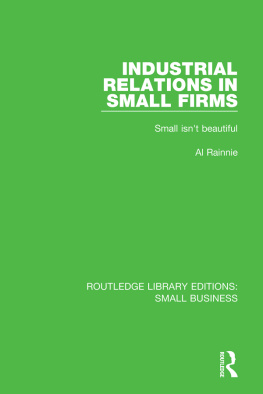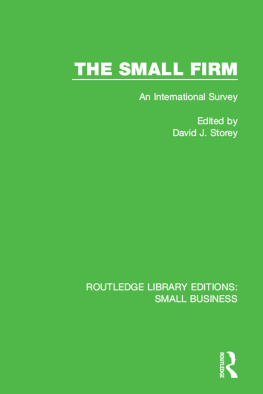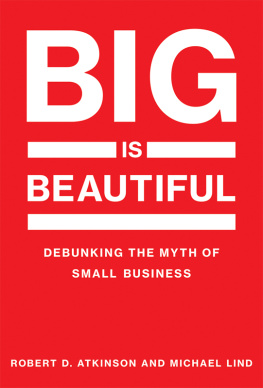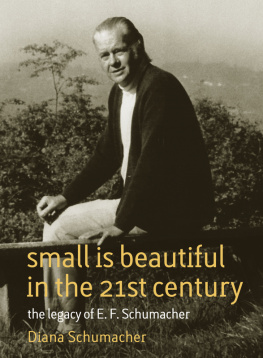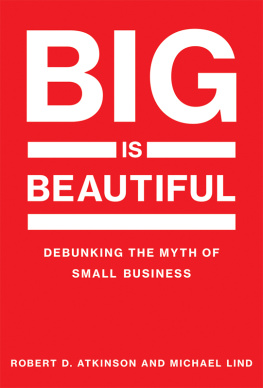Rainnie - Industrial relations in small firms small isn’t beautiful
Here you can read online Rainnie - Industrial relations in small firms small isn’t beautiful full text of the book (entire story) in english for free. Download pdf and epub, get meaning, cover and reviews about this ebook. City: Großbritannien., year: 2017, publisher: Routledge, genre: Politics. Description of the work, (preface) as well as reviews are available. Best literature library LitArk.com created for fans of good reading and offers a wide selection of genres:
Romance novel
Science fiction
Adventure
Detective
Science
History
Home and family
Prose
Art
Politics
Computer
Non-fiction
Religion
Business
Children
Humor
Choose a favorite category and find really read worthwhile books. Enjoy immersion in the world of imagination, feel the emotions of the characters or learn something new for yourself, make an fascinating discovery.
Industrial relations in small firms small isn’t beautiful: summary, description and annotation
We offer to read an annotation, description, summary or preface (depends on what the author of the book "Industrial relations in small firms small isn’t beautiful" wrote himself). If you haven't found the necessary information about the book — write in the comments, we will try to find it.
Rainnie: author's other books
Who wrote Industrial relations in small firms small isn’t beautiful? Find out the surname, the name of the author of the book and a list of all author's works by series.
Industrial relations in small firms small isn’t beautiful — read online for free the complete book (whole text) full work
Below is the text of the book, divided by pages. System saving the place of the last page read, allows you to conveniently read the book "Industrial relations in small firms small isn’t beautiful" online for free, without having to search again every time where you left off. Put a bookmark, and you can go to the page where you finished reading at any time.
Font size:
Interval:
Bookmark:

ROUTLEDGE LIBRARY EDITIONS:
SMALL BUSINESS
Volume 12
INDUSTRIAL RELATIONS IN SMALL FIRMS
INDUSTRIAL RELATIONS IN SMALL FIRMS
Small isnt beautiful
AL RAINNIE

by Routledge
2 Park Square, Milton Park, Abingdon, Oxon OX14 4RN
711 Third Avenue, New York, NY 10017
A catalogue record for this book is available from the British Library
ISBN: 978-1-315-54266-9 (Set) (ebk)
ISBN: 978-1-138-67991-7 (Volume 12) (hbk)
ISBN: 978-1-315-56354-1 (Volume 12) (ebk)
The publisher has gone to great lengths to ensure the quality of this reprint but points out that some imperfections in the original copies may be apparent.
The publisher has made every effort to trace copyright holders and would welcome correspondence from those they have been unable to trace.
Al Rainnie

Routledge
11 New Fetter Lane, London EC4P 4EE
29 WEst 35th Street, New York, NY 1001
TJ Press Ltd., Padstow, Cornwall
Rainnie, A
Industrial Relations in Smal Firms
1. Great Britain. Small firms. Industrial relations.
I. Title.
331-0941
The research on which this book is based was financed by the Economic and Social Research Council (ESRC). Athena Secretarial undertook the daunting task of translating my indecipherable scribble into legible text, I would like to thank them for their patience. This book would never have been written had not Janet Hannah and John and Anthea Stirling provided a constant supply of support and encouragement.
Small firms have come in from the cold. In the 1960s and 1970s economic growth, prosperity and jobs were supposed to be delivered by giant institutions. The grey impersonal machine, which brought together macro-economic demand management and the big corporations, churned out growth (Financial Times, 24 July 1986). The 1980s have completely overturned this approach. Small firms have found themselves, willing or not, thrust to the forefront of economic policy.
Future prosperity will be fed by an enterprise culture which will breed successive generations of entrepreneurs. They will drive the economy on, pulling together resources to use them more efficiently, creating new products, new markets, and new firms, (ibid.)
Small is supposed to be not only beautiful, but also dynamic, efficient, competitive and perhaps most important, a source of new jobs.
Enormous amounts of government time and money, 500 million per year by 1983 (British Business, 19 January 1986), are being spent promoting the image of the entrepreneur as dynamic saviour of a moribund economy, and the small firm as the only hope for reducing the ever-growing ranks of the dole queue. A return to Victorian values, to full red-blooded capitalism, the abolition of the Nanny State, and the re-emergence of individual responsibility and self-reliance are all purported to be embodied in the new entrepreneurialism. To this end, Sir Keith Joseph has written a new introduction to Samuel Smiless Self Help, and required all his civil servants to read what has been described as a ludicrous panegyric to Victorian capitalism {Observer, 19 January 1986).
Great stress is laid on the ability of the small firm sector to create jobs. Mrs Thatcher announced to the House of Commons in 1985 that a major fall in unemployment will come about when our people, instead of relying on increased subsidies, do exactly what is happening in the United States and Japan and set out to create more small businesses themselves (Guardian, 6 March 1986).
Superficially, the empirical data on small firms would seem to support the Prime Ministers enthusiastic exhortation to entrepreneurship. The Small Business Research Trust has reported a more than 10 per cent growth in the number of surviving businesses between 1980 and 1985. In 1980 there were around 1.29 million firms registered for VAT in Britain; by 1983 the stock of surviving firms had risen by 110,000. Between 1980 and 1984 there were 830,000 new registrations, but in the same period nearly 700,000 deregistered. Small firm death rate is high, more than 60 per cent failing in the first three years. Nevertheless work produced by the Research Trust (Bannock, 1985) argues that firms employing less than 100 people created more than half the new jobs in Britain between 1971 and 1981.
Allard (1983) has calculated that in the mid-1970s over 5 million people were employed in small firms; that figure may now be around 6 million (Labour Research Department, 1985).
Small firms are then, far from being marginal. In employment terms they are highly significant. But are Mrs Thatchers hopes of a small-business-led jobs revival realistic? Recent research would suggest not.
Important findings from the Policy Studies Institute have shown that although new small firms, by definition, create some jobs they also contribute far more than their fair share to the ranks of the unemployed. Daniel in reporting the findings of the MSC/PSI (Manpower Services Commission/Policy Studies Institute) survey of the employed concluded that:
A striking feature of the characteristics of the unemployed flow was how disproportionately they were drawn from small establishments. (Daniel, 1985, p. 58)
In other words far from creating jobs, small firms destroy them! However, it is not only in the field of job creation that the swirling mists of mythology that surround and conceal the true nature of small firms are being cleared. One of the main purposes of this book is to cut through the banal platitudes and exaggerated claims (Financial Times, 12 January 1984) that now surround small businesses.
Although there has been little systematic analysis of either the empirical reality or theoretical background to the growth in the small is beautiful bandwagon never mind the policy implications this situation is slowly changing. Mostly in a fragmented and uncoordinated way evidence is amassing that flatly contradicts the cosy family atmosphere often ascribed to small firms.
Font size:
Interval:
Bookmark:
Similar books «Industrial relations in small firms small isn’t beautiful»
Look at similar books to Industrial relations in small firms small isn’t beautiful. We have selected literature similar in name and meaning in the hope of providing readers with more options to find new, interesting, not yet read works.
Discussion, reviews of the book Industrial relations in small firms small isn’t beautiful and just readers' own opinions. Leave your comments, write what you think about the work, its meaning or the main characters. Specify what exactly you liked and what you didn't like, and why you think so.

